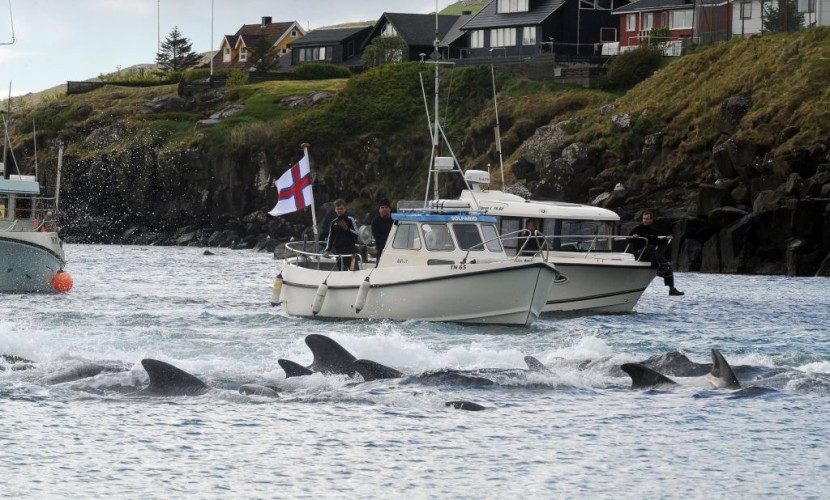
On Sunday, passengers aboard a luxury cruise ship witnessed with dread as their ship anchored at a small island where locals wielding knives and metal poles slaughtered wild whales as part of a centuries-old tradition of mass hunting.
Yahoo News Australia claimed that the North Atlantic Ocean off the shore of the Faroe Islands was stained with the blood of 78 long-finned pilot whales killed by hunters in the capital city of Torshavn.
78 Whales Slaughtered in Front of Cruise Passengers
As the Faroese tradition of grindadráp took place, passengers on a docked Ambassador Cruise Line ship were appalled to observe the locals harvesting their food in a manner that dates back centuries. Since then, the British cruise ship operator has apologized via Twitter, stating they were "disappointed that this search occurred while our ship was in port."
Grindadráp, or grind, occurs every summer and entails the widespread slaughter of marine mammals such as the pilot whale, a whale despite its name. Images of the event depicted whales of all ages covered in blood and crammed into containers.
Photographs of men fleeing the scene show them covered in blood and brandishing blades. Sunday at approximately 3:30 p.m., hunters on vessels began herding whales. Witnesses told Yahoo that locals on the shore quickly drew their blades and began hunting the animals.
According to witnesses, all marine mammals were killed in less than twenty minutes. Despite widespread opposition from international animal rights organizations, locals recognize the significance of procuring their natural sustenance.
The British cruise liner's apology to its astonished passengers was met with a divided response, with some criticizing the operator for criticizing local tradition and others calling for a complete boycott of the island.
The cruise line argues that a boycott of the island would not affect local attitudes regarding the widespread slaughter of marine mammals. Since 1948, the Faroe Islands have been a semi-autonomous region, not a member of the European Union, allowing whaling traditions to continue unimpeded.
In 2021, the slaughter of over 1,400 whales in the region prompted outrage. The chairman of the Faroese Whalers Association stated to the BBC that, although the number of whales slain was excessive, it was unintentional.
According to government statistics, the Faroese capture an annual average of 600 pilot whales. Between 2000 and 2020, at most, 773 white-sided whales were captured annually. Whaling is conducted following international law and internationally accepted principles of sustainable development.
Whatever is captured during the search is free to island residents. Ambassador Cruise Line reported that the company had instructed: "guests and personnel not to purchase or consume whale or dolphin meat and to oppose any profiteering from commercial whaling and dolphin hunts."
Faroe Islands' Whale, Dolphin Hunting
Per CBS News, the ship was carrying ORCA conservationists as it arrived in the Faroe Islands. According to the organization, pilot whales were herded into shallow waters using small vessels and jet skis. The whales were brought onshore and slaughtered.
The National Oceanic and Atmospheric Administration reports that long-finned pilot whales live between 35 and 60 years. They reach lengths of 19 to 25 feet and weigh 2,900 to 5,000 pounds as adults. According to NOAA, the species is imperiled by whaling, entanglement in fishing gear, disease, and water contaminants.
The Faroe Islands have a long history of pilot whale and dolphin hunting, profoundly entrenched in centuries-old cultural traditions. The searches can occur at any time and occur throughout the year.
Locals drive and herd pilot whale colonies toward the shorelines of designated harbors or fjords. Once whales reach shallow waters, they are driven onto the shore and killed with blades and hooks by waiting hunters.
Per Newsweek, the International Union for the Conservation of Nature (IUCN) classifies long-finned and short-finned pilot whales as "data deficient," which means there is insufficient information to determine their population status accurately.
Related Article : Helicopter Crashes Near Mount Everest in Nepal, Kills 6 People
© 2025 HNGN, All rights reserved. Do not reproduce without permission.








